Are you ready to revamp your living space in 2023 & 2024? Choosing the right couch color is a pivotal decision in the realm of interior design. As you embark on this journey, you’ll want to stay up-to-date with the latest trends. In this article, we’ll guide you through the most popular couch colors of 2023 & 2024, helping you make an informed choice that aligns with your style and the aesthetics of your rooms. So, which one will you pick to elevate your living space this year?
The importance of couch color in interior design
When it comes to interior design, the color of your couch can play a pivotal role in shaping the overall aesthetic and atmosphere of your living space. The choice of couch color is not a trivial matter; it can significantly impact the mood, style, and functionality of a room. In this article, we will delve into the importance of couch color in interior design, explore the various factors to consider when choosing the perfect hue, suggest the best couch colors for different rooms, and provide guidance on how to select the right sofa color for your specific needs.
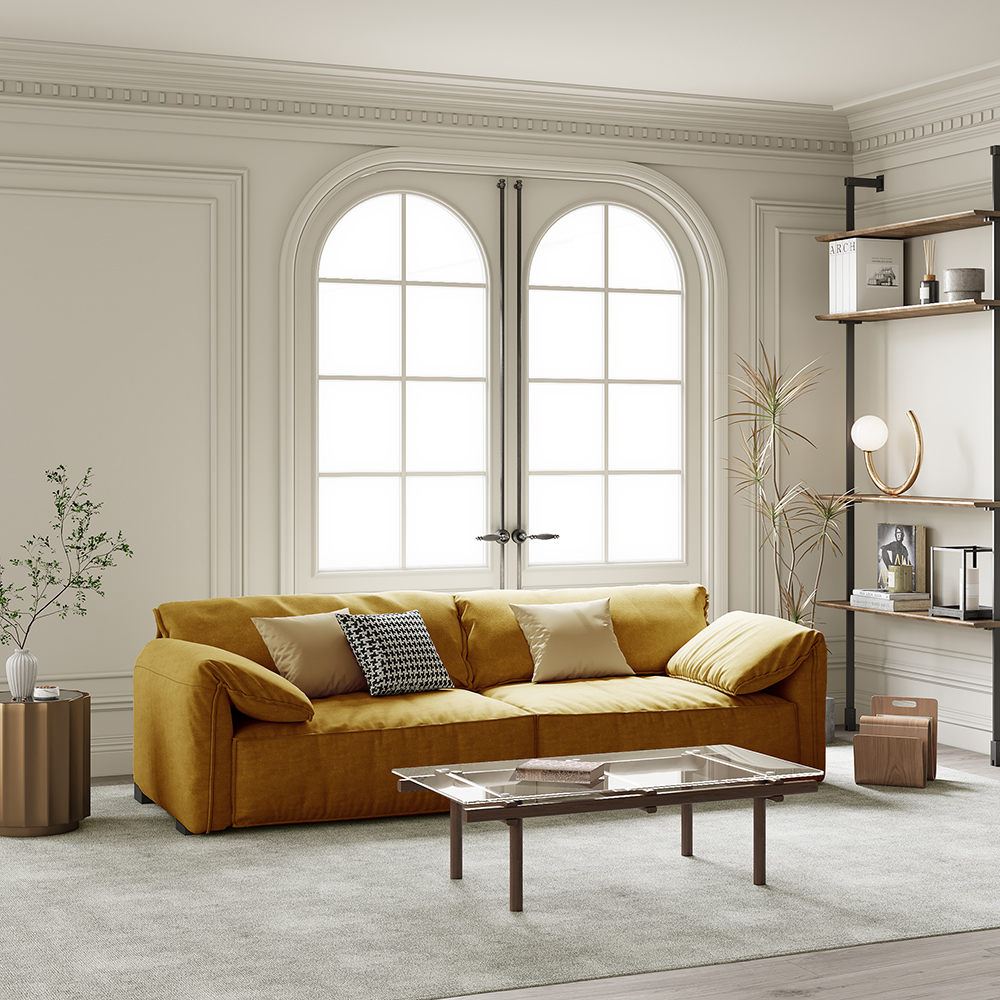
The different factors to consider when choosing a couch color
Selecting the ideal couch color is a decision that should not be taken lightly. Several key factors must be considered to ensure your choice harmonizes with your interior design vision. Let’s explore these factors in detail:
- Room’s Purpose and Functionality
Before you start perusing swatches and paint chips, think about the room’s intended purpose. Is it a formal living room, a cozy family gathering space, or a home office? The function of the room should guide your color choice. For formal spaces, neutral and elegant colors like beige, gray, or navy may be appropriate. In contrast, family rooms often benefit from warmer and more inviting tones like earthy browns or deep reds.
- Existing Color Palette
Consider the existing color scheme of your room, including the walls, flooring, and other furnishings. Your couch should complement these colors rather than clash with them. A color wheel can be a helpful tool in understanding complementary and contrasting hues. If your room already features dominant colors, you may want to opt for a couch color that harmonizes or contrasts effectively.
- Lighting Conditions
Natural and artificial lighting can significantly impact how colors appear in a room. A color that looks bright and vibrant in a well-lit showroom might appear dull and muted in a space with limited natural light. Conversely, a bold and dark color could overwhelm a room flooded with sunlight. Take into account the lighting conditions of your room to select a couch color that will shine in its intended environment.
- Personal Preferences
Your personal taste and style preferences should play a significant role in your decision. If you’re drawn to vibrant and bold colors, don’t be afraid to express your personality through your couch choice. On the other hand, if you prefer a more subdued and timeless look, neutrals and muted tones might be your preference.
- Maintenance and Lifestyle
Consider your lifestyle and how the couch will be used. If you have young children or pets, you may want to opt for a couch color that is forgiving when it comes to stains and spills. Darker colors and patterns can be more forgiving in such cases. However, if your lifestyle is more relaxed and stain-resistant fabrics are less of a concern, you have more freedom to explore lighter and brighter colors.
- Trend vs. Timelessness
Trends in interior design come and go, and what’s fashionable today might feel outdated in a few years. While it’s essential to stay up-to-date with design trends if that’s your preference, it’s also wise to consider whether you want your couch to remain stylish for the long haul. Neutral colors tend to be more timeless and versatile, allowing you to update your decor without replacing major furniture pieces.
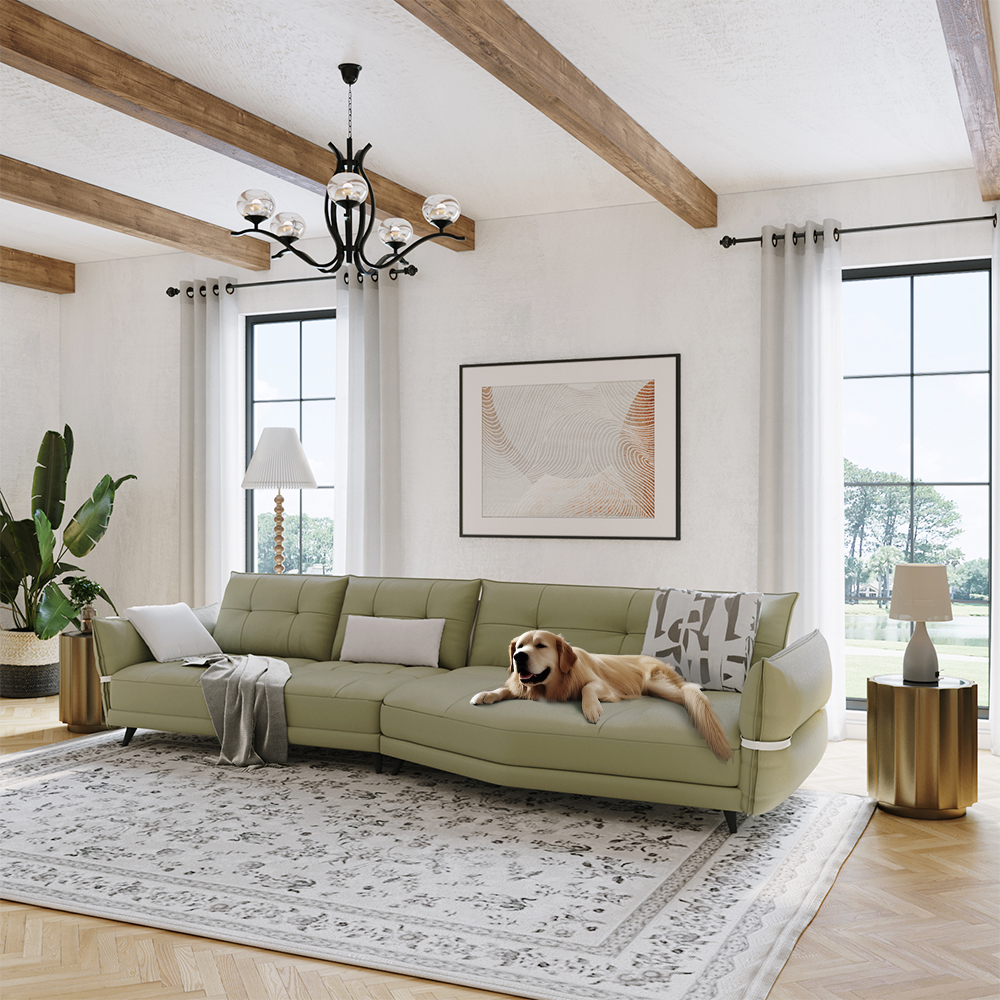
The best couch colors for different rooms
Let’s discover the best sofa color for living room or family room for every style, which makes your house look more coordinated.
Small living rooms
Small living rooms present unique design challenges, and selecting the right couch color can make a significant difference in maximizing space and creating a visually appealing environment. Here’s what you need to consider:
- Light and Neutral Colors
In small living rooms, light and neutral colors work wonders. Shades like white, beige, light gray, or soft pastels can make your space feel more open and airy. Light colors reflect natural light, creating an illusion of more space. They also have a timeless quality that complements various design styles.
- Monochromatic Schemes
Opting for a monochromatic color scheme, where your couch color matches or closely coordinates with the wall color, can visually expand the room. It creates a seamless flow that blurs the boundaries, making the room feel more spacious. You can add depth and interest with different shades and textures within the same color family.
- Avoid Dark and Overbearing Colors
Dark or overly vibrant colors can make a small living room feel cramped and closed in. It’s best to avoid couches in deep browns, blacks, or bright reds if your goal is to maximize the perception of space. These colors tend to absorb light and create a cozier but potentially claustrophobic atmosphere.
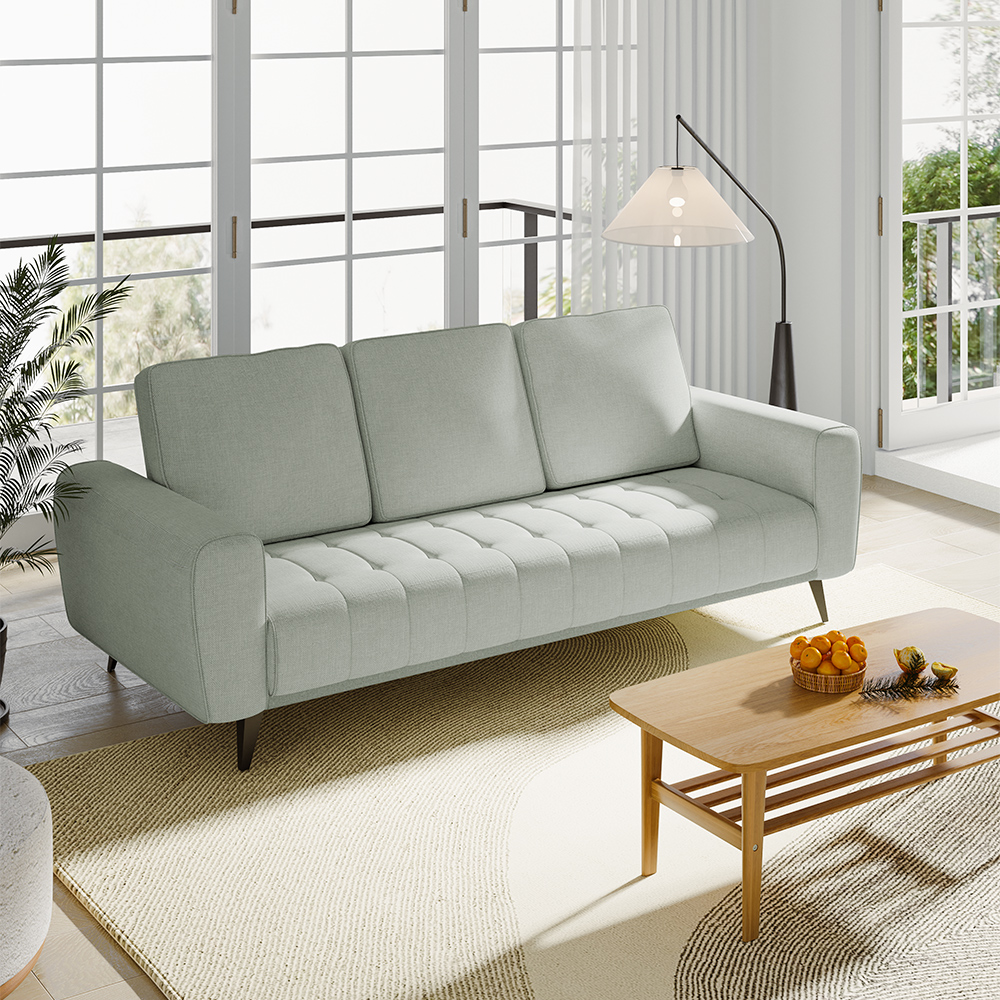
Large living rooms
Large living rooms provide more freedom when it comes to couch color choices. However, certain colors can enhance the aesthetics and functionality of your spacious area:
- Warm and Inviting Tones
In large living rooms, warm and inviting colors like deep browns, rich earthy tones, or warm grays can create a cozy and welcoming atmosphere. These colors can help balance the vastness of the space and make it feel more intimate.
- Bold Statement Colors
Large rooms are an excellent canvas for bold statement colors. Consider vibrant jewel tones like emerald green, sapphire blue, or deep burgundy for a touch of drama and personality. These colors can become focal points and infuse energy into the room.
- Contrasting Colors
To add visual interest and prevent a large room from feeling monotonous, consider using couch colors that contrast with the surrounding decor. For example, a white couch in a room with dark walls or vice versa can create a striking and balanced look.
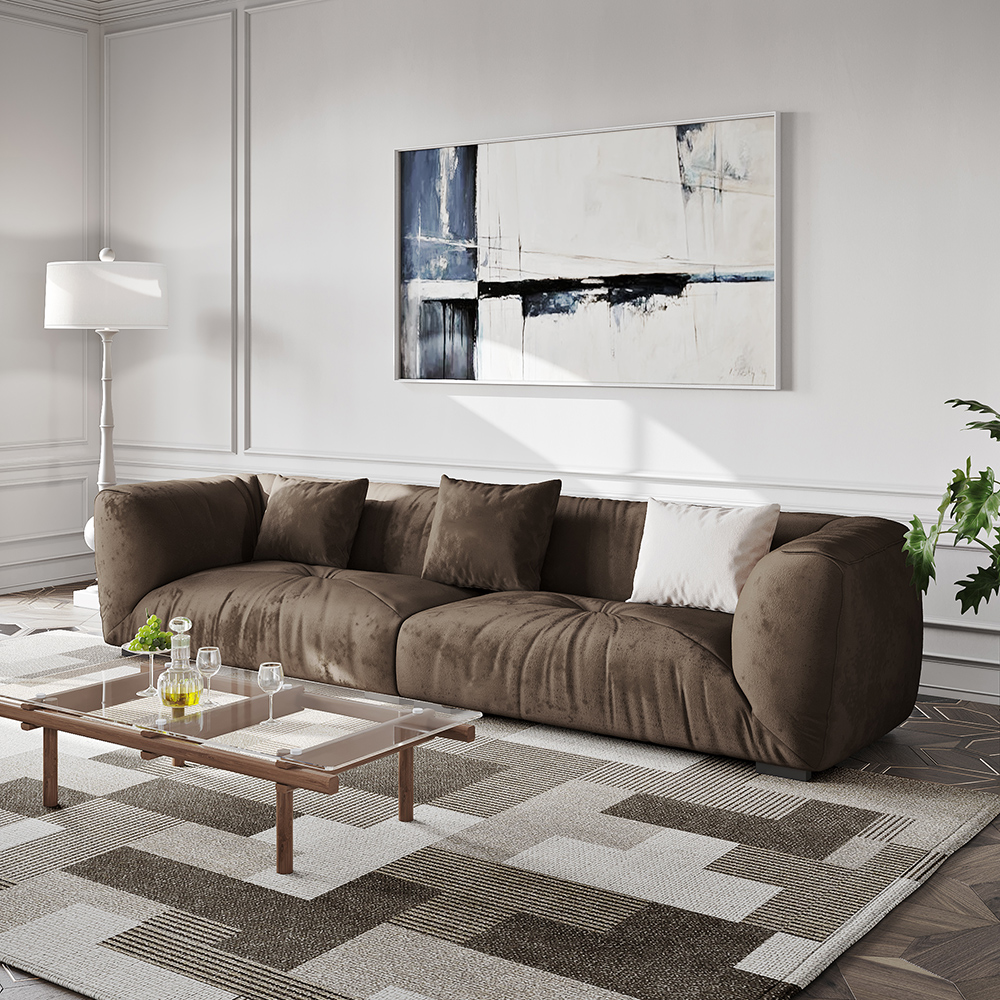
Family rooms
Family rooms are where comfort, durability, and style intersect. The ideal couch color for family rooms should accommodate these needs:
- Stain-Resistant Neutrals
Family rooms often see a lot of activity, including spills and stains. Opt for stain-resistant neutral colors like beige, light gray, or soft tan. These hues can hide minor imperfections and are forgiving when it comes to accidental spills.
- Durable Fabrics
Choose couches upholstered in durable and easy-to-clean fabrics like microfiber, leather, or performance fabrics. These materials can withstand the wear and tear of family life and maintain their appearance over time.
- Colorful Accents
While neutrals are practical for the couch itself, add pops of color through accent pillows, throws, and other decor elements. This allows you to inject personality and style into the room without compromising on the practicality of the couch color.
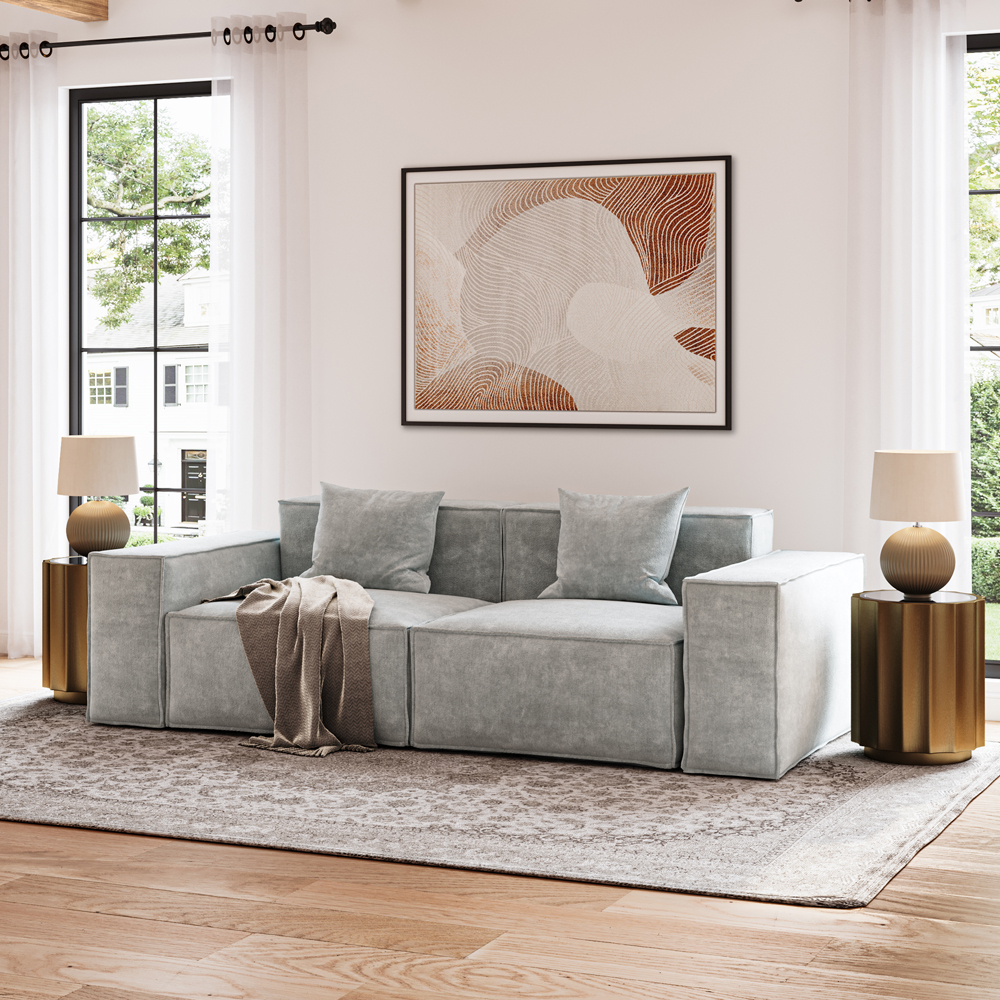
Media rooms
Media rooms are spaces dedicated to entertainment, and the right couch color can enhance the cinematic experience. Here’s what to consider:
- Dark and Moody Hues
Dark colors like charcoal gray, deep navy, or rich chocolate brown can create a cozy and immersive atmosphere in a media room. These colors reduce glare on screens and help maintain a focus on the movie or TV show.
- Low Reflectivity
Avoid couches with highly reflective or glossy fabrics as they can cause distracting reflections on TV or projector screens. Opt for matte or low-sheen materials that minimize glare.
- Comfortable Seating
In media rooms, comfort is paramount. Choose couches with plush cushions and ample seating space to ensure everyone can relax and enjoy the entertainment. Consider reclining or sectional sofas for added comfort and flexibility.
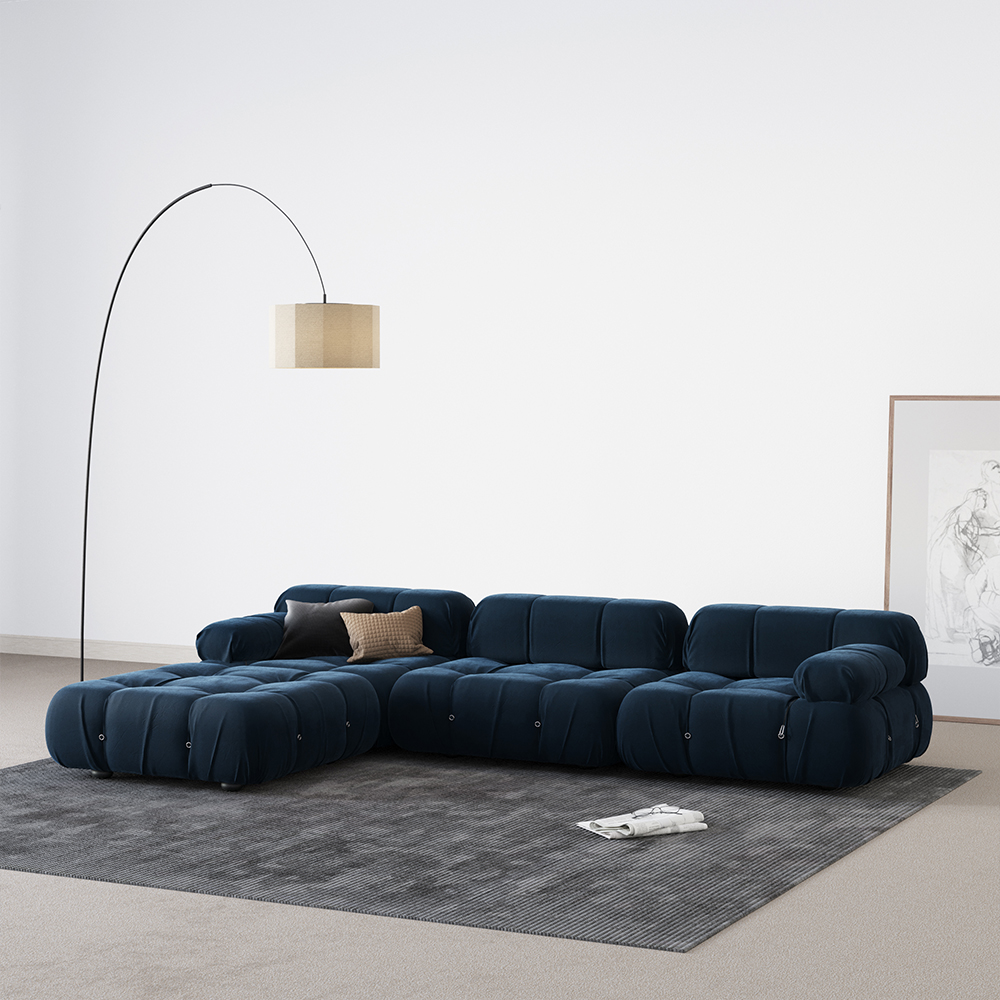
Minimalist living rooms
Minimalist living rooms thrive on simplicity and clean lines. The right couch color should align with the minimalist aesthetic:
- Monochromatic Neutrals
Minimalist living rooms often feature monochromatic color schemes. Choose a couch in a neutral color like white, gray, or beige to maintain the minimalist vibe. These colors create a sense of calm and simplicity.
- Sleek and Simple Designs
Opt for couches with sleek and uncomplicated designs that complement the minimalist aesthetic. Avoid ornate details or excessive embellishments.
- Limited Color Palette
Stick to a limited color palette throughout the room, including the couch, walls, and decor. This cohesive approach creates a harmonious and visually pleasing space that aligns with minimalist principles.
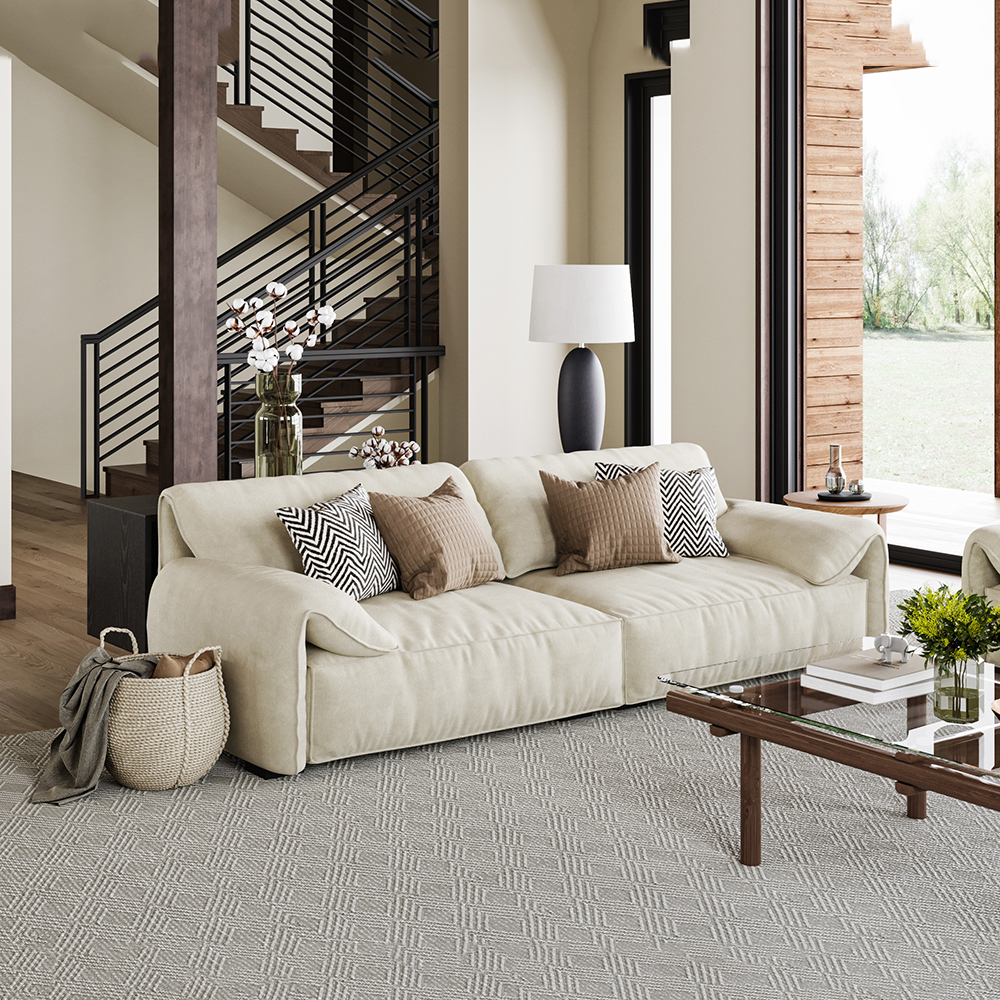
Traditional living rooms
Traditional living rooms exude elegance and timeless charm. To complement this style, consider the following couch color choices:
- Classic Neutrals
Traditional living rooms often feature classic neutrals such as beige, cream, or soft brown. These colors create a sense of warmth and sophistication that aligns with traditional design principles.
- Rich Jewel Tones
For a touch of luxury and opulence, jewel-toned couches like deep emerald, sapphire blue, or ruby red can add a regal flair to traditional living rooms. These colors create a striking contrast with traditional wood furnishings.
- Floral or Paisley Patterns
Consider couches with traditional floral or paisley patterns for a touch of nostalgia and vintage charm. These patterns can serve as focal points and enhance the traditional ambiance of the room.
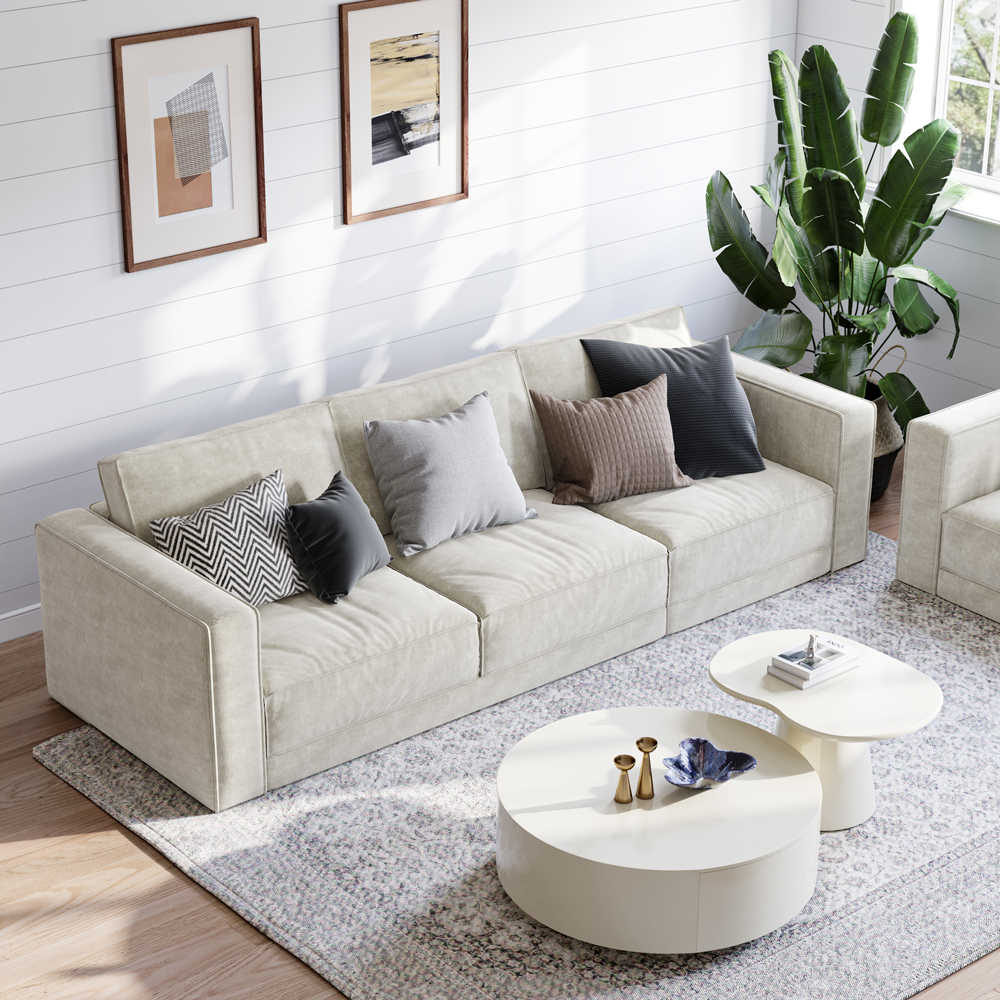
Modern living rooms
Modern living rooms are known for their clean lines and contemporary aesthetics. To achieve a modern look, focus on the following couch color options:
- Neutral and Monochromatic
Modern living rooms often feature neutral and monochromatic color palettes. Choose couches in shades like white, gray, or black to maintain a sleek and streamlined appearance. These colors serve as a versatile backdrop for modern decor.
- Bold and Vibrant Accents
While neutrals are prevalent in modern design, you can introduce pops of color through accent pillows, rugs, and artwork. Consider adding bold and vibrant hues like bright red, electric blue, or sunny yellow to infuse energy into the room.
- Minimalist Color Blocking
Create a modern statement by incorporating color blocking techniques. This involves using bold and contrasting colors in strategic areas of the room, including the couch. For example, a white couch paired with a black coffee table and red accent chairs can create a striking modern effect.
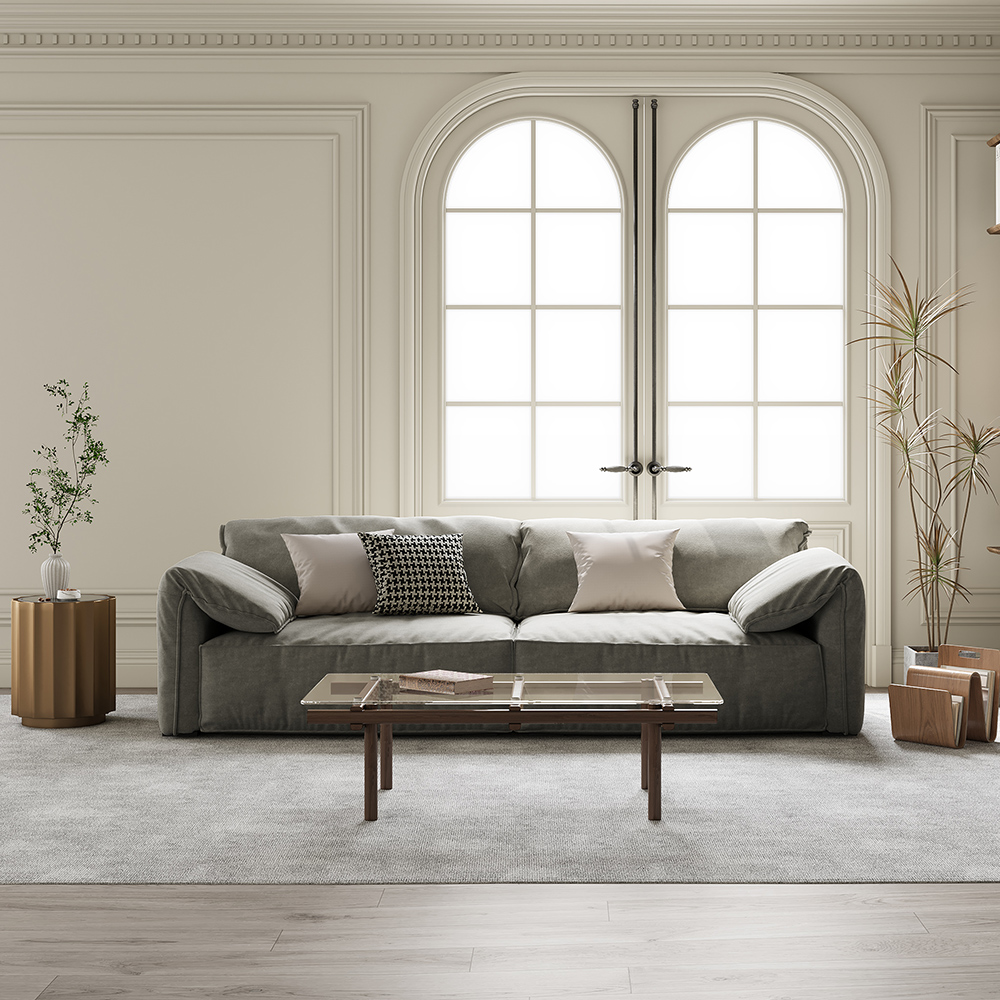
The most popular sofa colours forecast for 2024:
- Grey sofas
- Green sofas
- Blue sofas
- Pink sofas
- Black sofas
- Navy sofas
- Teal sofas
- Beige sofas
- Orange sofas
- White sofas
- Yellow sofas
- Brown sofas
Those are the popular colors for sofas in 2024, but they may not be suitable for your home. According to our street interview, people would spend $2000 to $5000 in picking up a sofa, which is a big investment. If the color is wrong, you must be very upset. Thus try to consider more factors to bring a sofa into your house.
How to choose the right sofa color for you
Now that you have a better understanding of the importance of couch color and the factors to consider, let’s explore how to choose the right sofa color that suits your unique preferences and needs:
- Begin with Neutrals
If you’re unsure about the perfect color, start with a neutral couch. Neutral colors like beige, gray, or taupe are versatile and can adapt to various design schemes. You can then use accent pillows, throws, and rugs to introduce splashes of color and personality into the room.
- Consider Your Style
Think about your personal style and the atmosphere you want to create. Are you going for a modern, minimalist look, or do you prefer a more eclectic and colorful aesthetic? Your style should guide your color choice, whether it’s sleek and monochromatic or vibrant and eclectic.
- Test Swatches
Before making a final decision, obtain fabric swatches or paint samples to see how they look in your space. Place the swatches near your existing furniture, flooring, and wall colors to gauge how well they harmonize. Lighting can also affect how colors appear, so assess them under different lighting conditions.
- Seek Professional Advice
If you’re uncertain about color choices or have a unique design challenge, consider consulting with an interior designer. They can provide expert guidance on color coordination and help you achieve your desired aesthetic.
- Don’t Be Afraid to Experiment
Remember that you can always change the color of your couch by using slipcovers or reupholstering it. This allows you to experiment with different colors over time without committing to a permanent choice.
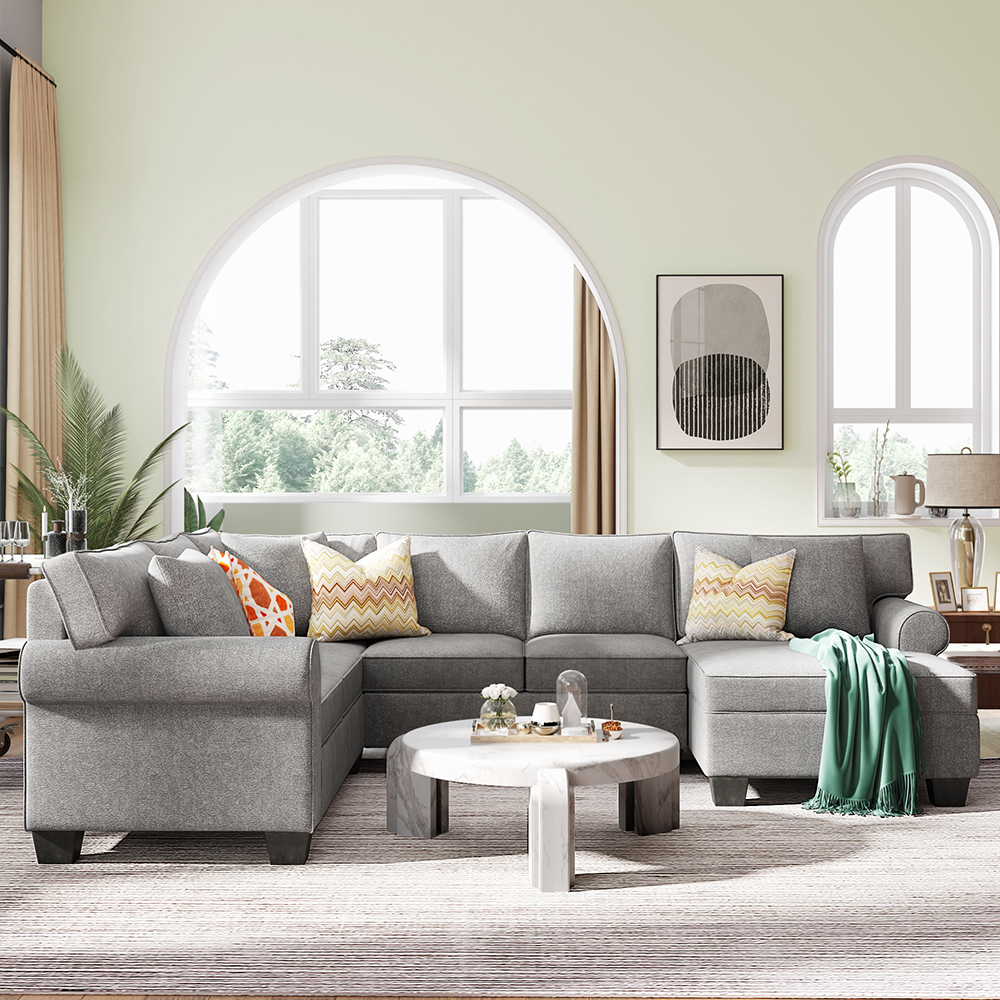
Conclusion
The color of your couch is a critical element of interior design that can significantly impact the overall look and feel of your living space. By carefully considering factors such as the room’s purpose, existing color palette, lighting, personal preferences, lifestyle, and trends, you can choose the perfect couch color that enhances your home’s aesthetic and meets your specific needs. Whether you opt for timeless neutrals or bold statement hues, the right sofa color can transform your space into a haven of comfort and style.
